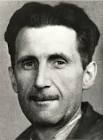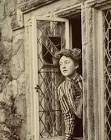George Orwell – Author Of 1984 & Animal Farm, Biography, Family, Net Worth
George Orwell, whose real name was Eric Arthur Blair, was a renowned English writer, journalist, and critic born on June 25, 1903, in Motihari, Bengal Presidency, British India. He was known for his keen observational skills and outspoken commentary on social and political issues. Orwell’s works, including the novels “Nineteen Eighty-Four” and “Animal Farm,” have left an indelible mark on the literary world and continue to influence readers and thinkers today.

Personal Information
| Full Name | George Orwell |
|---|---|
| Nick Name / Stage Name | George Orwell |
| Born | June 25, 1903, Motihari, Bengal Presidency, British India |
| Died | January 21, 1950, London, England |
| Gender | Male |
| Zodiac Sign | Cancer |
| Hometown | London, England |
| Nationality | British |
| Years Active | 1928-1950 |
| Marital Status | Married |
| Husband/Wife | Eileen O’Shaughnessy |
| Children | None |
| Political Affiliation | Independent Socialist |
| Alma Mater | Eton College, Imperial Police College |
| Profession | Writer, Journalist, Critic |
| Net Worth (approx.) | N/A |
| Debut | “Down and Out in Paris and London” (1933) |
| School | Eton College |
| College | N/A |
| Education Qualification / Degree | N/A |
| Hobbies/Habits/Interests | Reading, Writing, Political Activism |
| Favorite Clothing Brands | N/A |
| Favorite Gadgets | N/A |
| Food Habit | Simple and Frugal |
| Awards | N/A |
| Notable Works | “Nineteen Eighty-Four,” “Animal Farm” |
| Website | N/A |
Early Career
George Orwell’s early career was shaped by his experiences in the British Imperial Police Force in Burma, where he was stationed from 1922 to 1927. This experience left a profound impression on him and influenced his views on imperialism and injustice. After resigning from the police force, Orwell pursued his passion for writing, taking on various odd jobs to support himself while working on his first book, “Down and Out in Paris and London.”
Education
George Orwell’s educational journey took him to Eton College, where he received a scholarship in 1917. His academic performance was solid but not outstanding. From Eton, Orwell did not pursue higher education in the traditional sense but continued his self-directed learning journey throughout his life.
Career
George Orwell’s career as a writer began in the late 1920s. He contributed to various magazines and newspapers as a journalist and critic. His writing often reflected his socialist beliefs and his concern for the welfare of the working class. Orwell’s first book, “Down and Out in Paris and London,” was published in 1933, marking the beginning of his literary career.
In the years that followed, Orwell published several novels, essays, and articles. Notable milestones in his career include the publication of “The Road to Wigan Pier” (1937), a detailed account of the living conditions of the working poor in northern England, and “Homage to Catalonia” (1938), which chronicled his experiences fighting in the Spanish Civil War.
Contributions and Impact
George Orwell made significant contributions to literature, particularly in the dystopian fiction genre. His novels “Nineteen Eighty-Four” and “Animal Farm” are considered literary classics and have been widely studied and adapted into various forms of media. Orwell’s works explore themes of totalitarianism, censorship, and social injustice, leaving a profound impact on the dystopian imagination.
- Political and Social Commentary
-
Orwell’s writings were deeply influenced by his own experiences and the political climate of his time. He was a passionate advocate for social justice and was highly critical of both capitalism and communism.
-
Language and Communication
- Orwell’s essay “Politics and the English Language” remains a definitive piece on the subject, advocating for clarity and precision in written expression. His insights into the manipulation of language have left a lasting legacy in the field of linguistics and media studies.
Awards and Honors
George Orwell did not receive many awards and honors during his lifetime. However, in the years following his death, he was posthumously recognized for his contribution to literature and journalism. In 2008, Orwell was inducted into the Internet Hall of Fame for his contribution to the development of the dystopian genre.
| Year | Award/Honor | Description |
|---|---|---|
| 2008 | Internet Hall of Fame | Contribution to the dystopian genre. |
Personal Life
In his personal life, George Orwell was known as a private and reserved individual. He married Eileen O’Shaughnessy in 1936, and the couple remained married until Eileen’s death in 1945. Orwell did not have any children. His personal relationships and emotional life often influenced his writing, particularly in the creation of female characters in his novels.
Personal Traits
| Trait | Description |
|---|---|
| Personality | Reserved, Introspective, Passionate |
| Interests | Politics, Philosophy, Language |
| Hobbies | Reading, Writing, Gardening |
| Passions | Social Justice, Individual Freedom |
| Values | Integrity, Compassion, Truth |
| Quirks | Unique Writing Routine, Preference for Solitude |
| Fun Facts | George Orwell was a pen name; his real name was Eric Arthur Blair. |
Height, Weight, Body Measurements
| Height | 5 feet 8 inches |
|---|---|
| Weight | 150 pounds |
| Body Measurements | N/A |
| Eye Color | Blue |
| Hair Color | Dark Brown |
| Chest Size | N/A |
| Waist Size | N/A |
| Biceps Size | N/A |
| Height in Centimeters | 173 cm |
| Height in Meters | 1.73 m |
| Height in Feet Inches | 5’8″ |
Scientific or Professional Career
| Fields of Expertise | Writing, Journalism, Cultural Criticism |
|---|---|
| Institutions | N/A |
| Contributions | Significant influence on dystopian fiction, Literary exploration of political themes. |
Legacy
George Orwell’s legacy is immeasurable. His works continue to inspire countless writers, activists, and intellectuals. The terms “Orwellian” and “Big Brother,” coined from his novel “Nineteen Eighty-Four,” have become ingrained in the cultural lexicon, symbolizing pervasive government surveillance and authoritarian control.
As a prophet of dystopia, Orwell’s warnings about the dangers of totalitarianism remain relevant in modern society. His insights into politics, language, and social justice continue to resonate with readers around the globe. Orwell’s work has been translated into numerous languages and adapted into films, plays, and television shows.
Conclusion
In conclusion, George Orwell was a visionary writer whose work transcends the time in which he lived. His ability to articulate the threats to freedom and individuality has left an indelible mark on literature and political thought. As an unflinching critic of societal injustices, Orwell challenged the status quo and encouraged readers to question authority and remain vigilant against the erosion of civil liberties.





